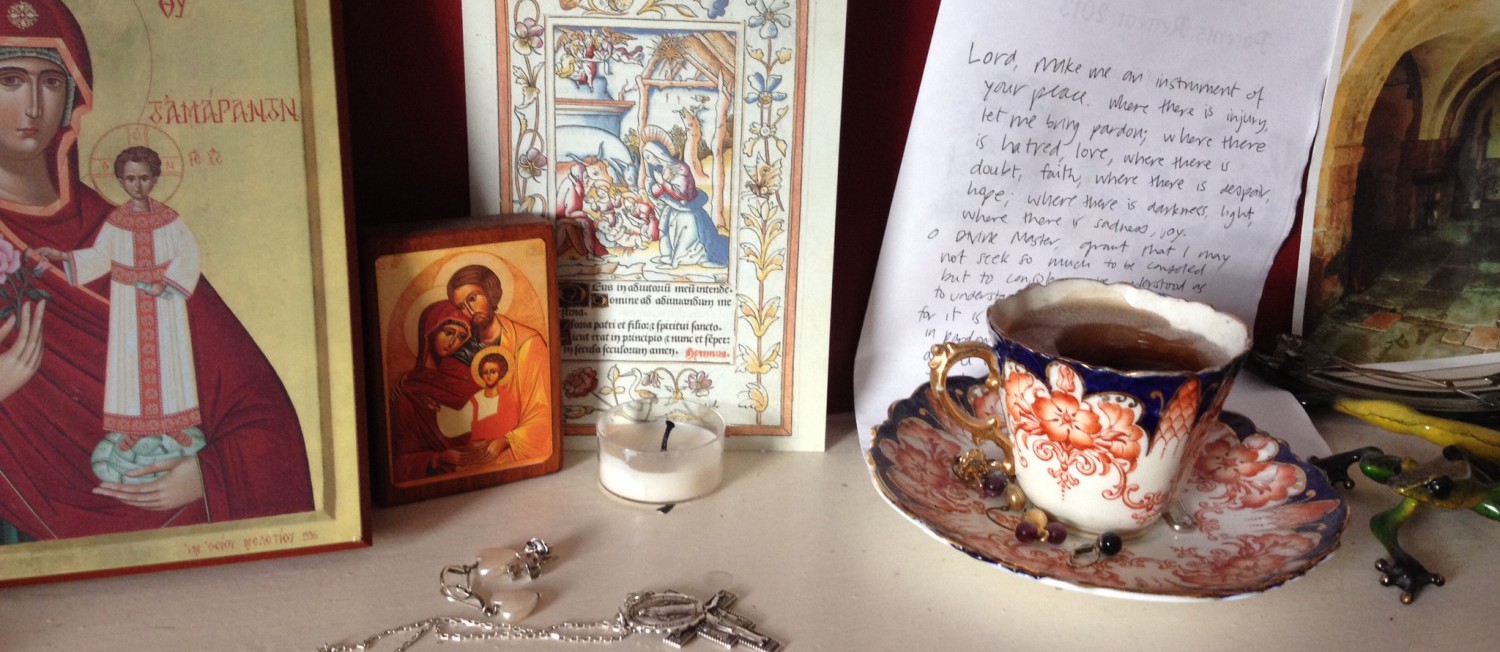I arrived late to the funeral. It was already the homily, which I didn’t really catch. But I stood at the back of church and looked out over the heads of all the parishioners who were present. Sitting in the back row was a friend, just in front of me–a friend who had survived breast cancer several years ago.
I wondered what on earth you’d think if you’d beaten cancer and then watched someone you’d known for twenty years succumb to it. ‘But for the grace of God, there go I’? No. As soon as the sentence occurred to me, I rejected it. Was the grace of God not present with S. ? Was God’s grace not attending her every step along the way? From the diagnosis through the treatment, during her reprieve and in hospice, there can be no doubt that the grace of God was constantly present with her.
Twice I went to the hospice: once to say the rosary with S. and the others from the rosary group (plus a few), and once to visit her, taking along a cake for her husband’s birthday. On both occasions, the peacefulness of the place, and of S.’s countenance, struck me. Even though she never woke during my second visit, I was very glad to have seen her. She seemed completely at peace. And I said goodbye.
I suspected it might be the last goodbye, and so it was. The next week, before I had a chance to get back to the hospice, she died. Her family were all around her. And I have no doubt about God’s presence, God’s peace and grace, being there with her.
Being nearby, but not very close, I am not at all certain what it is really like to accompany someone through their last weeks and days. The romantic part of me likes to think it is as CS Lewis describes the easternmost part of the voyage of the Dawn Treader, as they approach the end of the world. The seawater has become fresh and sweet–and so nourishing that food is no longer required. What’s more, the dazzling brightness of the sun increases day by day. Only the richness of the water strengthens the travelers enough to bear its overwhelming light. As they near the end, the world’s end, they are being fortified. The crew of the Dawn Treader are not going to the world’s end to stay, however. They are all accompanying Reepicheep, who is going to the end and not returning to Narnia. Reepicheep was bound for Aslan’s country. So only he was really going to the end (though, as it happened, Lucy, Edmund, and Eustace also departed back to England at the end of the world), yet all those accompanying them share in the water and the light that prepares them to meet the end when they reach it.
I do not know, but I hope and pray that S.’s family had some experience of that journey, which despite being deeply sad may also somehow be full of grace. From a little ways off, it seemed to me that the light shone brightly, despite being difficult to bear. The few times I saw S. and spoke to her in the final few months, I found her matter-of-fact attitude bracing. When I asked about how she was doing in the longer term, she discussed going back to work (her health had improved that much). But when I sounded too hopeful, she reminded me: ‘I still have terminal cancer’, as matter-of-factly as if she were talking about plans for the next summer holidays. Her concern was for the family.
Always, she bore it well. And she carried on doing things for the family and in the community for as long as she possibly could. How could anyone say anything other than that the grace of God remained with her through the illness and in the moment of her death? Death cannot separate us from God’s grace. Cancer cannot separate us from God’s grace.
If anything, I ought to have looked at her coffin on the day of her funeral and thought, one day, by the grace of God, there go I.
Deo gratias.
